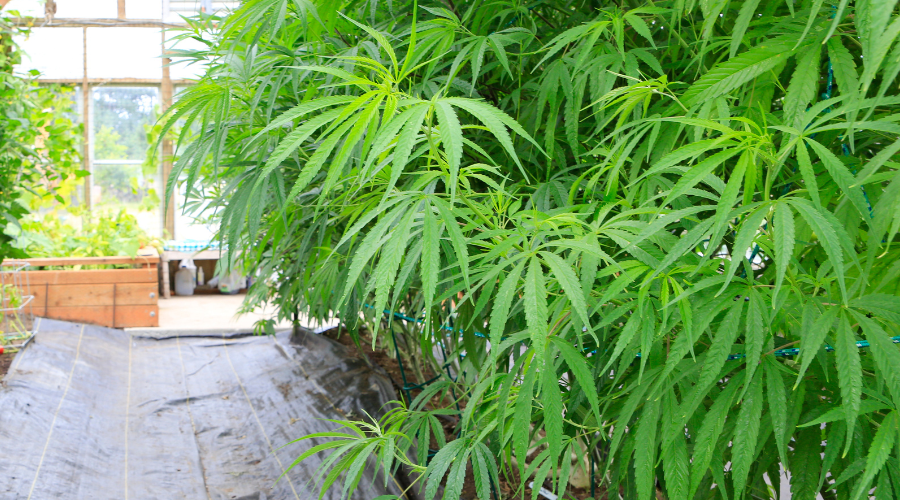What’s Stopping Hemp From Cropping Up Everywhere?
CIC Executive Committee member Jamie Bartley leads the Unyte Group, which comprises seven distinct businesses, all inter-linked by Cannabis and Hemp, with expertise in everything from medical to capital to construction. Right now he’s pushing for further investment into the UK’s industrial hemp sector, as well as legislative change, to help spark what he believes is a super crop that has the potential to transform the British landscape, economy, and future.
Industrial Hemp Is The Future
I see industrial hemp and the solutions it can provide as having the potential to make positive, lasting change across the world – in numerous different sectors.
As grandiose as it might sound, Hemp on a large cultivation scale can have hugely positive planetary effects: including decarbonisation and the replacement of fossil fuel derived carbon products.
However, whichever way you spin it – even when you explain the differences between recreational, medical, and wellness markets and the uses of industrial Hemp – there’s no disguising the fact that Hemp is ‘Cannabis’. And people’s natural reaction to the word ‘Cannabis’ continues to be a big barrier for Hemp.
What’s perhaps more interesting is that the stigma is really a very recent thing. As a society, we’ve been using Hemp for hundreds – thousands, even – of years. In fact, the word ‘canvas’ comes from ‘Cannabis’.
But linguistics aside, the biggest barrier to making Hemp the super crop it richly deserves to be is the increased cost of processing it. Commercial viability is only going to come with investment and the creation of dedicated facilities to handle Hemp.
However, given the hugely positive benefits that come from a plant that can repair a lot of the damage that’s been inflicted on the environment (did you know that Hemp was actually used to help clean up contaminated land after the Chernobyl disaster?) with the right mix of advocacy, investment, and legislative reform, we can reinvigorate the UK’s once thriving Hemp industry.
Where Can Hemp Make The Most Impact?
We’ve got 4.8 million hectares of arable land here in Britain, and there’s no reason we shouldn’t be growing Hemp on 30% of that in a crop rotation – especially when you can still take food from the seed. As a result of Hemp producing four times as much biomass as forestry does during the same growth period, food security and crop yields would be guaranteed to increase.
Research shows that crops planted after hemp will have their yield increased by 16 to 18% all because of the minerals and nutrients that Hemp draws from deep in the soil. It’s tough to boost your top line in farming but a 2% increase in crop yield is huge. The behaviour of hemp as a crop also means that it actually reduces flood risk so makes crop growth not only better, but also safer.
Hemp is also a great late-season source of pollen. It flowers late in the fields at a point in the year when no other crop will. This gives pollinators – like bees – the perfect source late in the year. That’s Hemp having positive effects on the flora and fauna of the entire UK.
But it’s not just agriculture that can get a boost from Hemp. We need to decarbonise new buildings. And with a drive to build more housing across the country, there is a real need for the adoption of Hemp-based products. In the housing market, for example, existing materials aren’t up to scratch. When you look at many of today’s insulation products, they’re often mined from the ground with massive plant equipment, then crushed, before being heated to 1600 degrees Celsius in a kiln.
This is all before the material has gone into a building. Once it’s in there it exudes volatile organic compounds into the building and then goes to a landfill at end of life. Not what you would call environmentally-friendly.
So right there, big boosts to UK farmers, greener construction, the environment we all share – why aren’t more people listening?
How Do We Make This Happen?
The 10 recommendations of the Maple Tree report go a long way in unlocking the potential of Hemp as well as the wider Cannabis industry. The main point the industrial Hemp industry needs to get behind is increasing the THC levels allowed in our Hemp crops – from 0.2% to 1% – so we can work with a broader range of cultivars, which would allow for a greater range of choice for farmers as to what they grow.
On top of that, the volume of CBD that could be extracted from that Hemp would be far more commercially viable. Right now, licences for growing Hemp in the UK stipulate that you must destroy the flower in the leaf. This has to change – so that we can unlock Hemp as a crop that farmers can believe in and benefit from.
On the industry side, we need to work toward standardisation, using kitemarks to demonstrate the control and understanding we have of the standards required. In part, that work helps to make quality more consistent – but it also has the benefit of making the Hemp industry look as professional and developed as other areas of agriculture. This will certainly bring more confidence – and ultimately capital – into the sector.
The CIC is currently collaborating with DEFRA, the Home Office, and the Government to advocate for sensible changes that enable the Hemp crop to be maximised as a tool for achieving the economic and environmental benefits that we all know it can have. Talk to your local MP, it really can make a difference.



